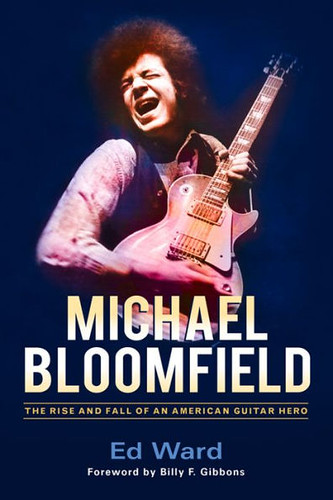"The music you listen to becomes the soundtrack of your life. It may be the first music you made love to or got high to or went through your adolescence to, went through poignant times of your life—well, that music is going to mean a lot to you. It's going to take on much more import than just the sound of the notes, because it's the background track for your existence."
– Michael Bloomfield, in an interview with
Tom Yates and Kate Hayes, February 13, 1981.
 At 11:00 a.m. on February 15, 1981, Michael Bloomfield was found slumped over the steering wheel in his parked car, keys still in the ignition, in a part of San Francisco in which he never frequented. The pathologist ruled the cause of death as cocaine and methamphetamine poisoning -- very odd, considering that Michael never touched cocaine, and as a lifelong insomniac, why would he intentionally take two drugs that keep one awake? Questions, sadly, that will never be answered.
At 11:00 a.m. on February 15, 1981, Michael Bloomfield was found slumped over the steering wheel in his parked car, keys still in the ignition, in a part of San Francisco in which he never frequented. The pathologist ruled the cause of death as cocaine and methamphetamine poisoning -- very odd, considering that Michael never touched cocaine, and as a lifelong insomniac, why would he intentionally take two drugs that keep one awake? Questions, sadly, that will never be answered.
Fortunately, we still have his music....
When Bob Dylan went electric at the 1965 Newport Folk Festival, Michael Bloomfield was on that same stage, backing Dylan on guitar. This was three days before Michael's twenty-second birthday. Here's what Ed Ward wrote about that performance:
"During 'Maggie's Farm,' Bloomfield becomes Dylan's second voice. He sits so hard on top of the beat that it screams, and what he plays amounts to a sardonic running commentary on Dylan's song. Bloomfield approaches atonality in a couple of places, but his playing on 'Maggie's Farm' sits squarely within the blues tradition. It's not hard to understand why some people in the audience were confused, because what Bloomfield gave them on the evening of July 25, 1965, was the future of rock guitar."
Following Newport, Bloomfield then played on the Dylan recording sessions, along with Al Kooper who also played at Newport, for the album Highway 61 Revisited
In addition to Highway 61 Revisited, here are a few "must have" albums that showcase Michael Bloomfield's work. I assume most, if not all, of these albums are available for streaming, but that's not my thing. Personally, I want the physical media, and the larger (i.e. vinyl) the better:
- The Paul Butterfield Blues Band self-titled album (1965)
- The Paul Butterfield Blues Band - East-West (1966)
- The Electric Flag - A Long Time Comin' (1968)
- Mike Bloomfield, Al Kooper, Steve Stills - Super Session (1968)
- The Live Adventures of Mike Bloomfield and Al Kooper (1969)
- Michael Bloomfield and Friends - Live at Bill Graham's Fillmore West 1969
- Nick Gravenites - My Labors (1969)
- Muddy Waters - Fathers and Sons (1969)
Michael Bloomfield, to Ed Ward, on why he chose not to tour with Dylan following the release of Highway 61 Revisited:
"With Bob, I'd have no identity. I didn't even know that [at the time]. All I knew was that I didn't understand what was happening....So I told Albert [Grossman, Dylan's manager], 'Man, I'm a bluesman. I'll go with Butterfield.' And I played with Butter and didn't play with Dylan, and we were cookin'. We wailed from then on."
Michael Bloomfield: The Rise and Fall of an American Guitar Hero by Ed Ward (Chicago Review Press Inc., 2016, Revised Edition).
by Ed Ward (Chicago Review Press Inc., 2016, Revised Edition).

No comments:
Post a Comment